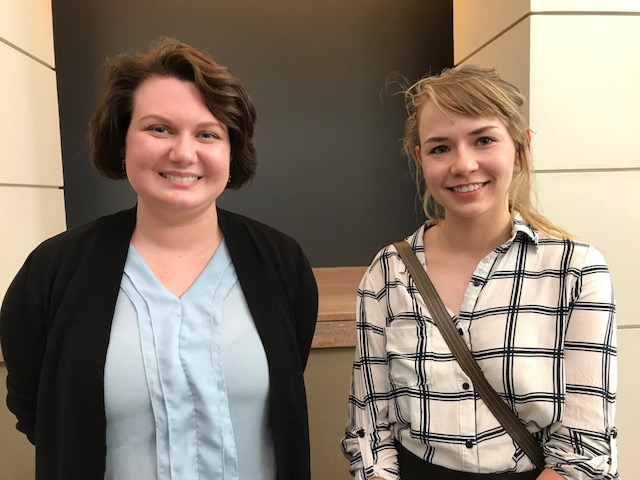Grace Atkins, User Engagement Librarian, won an Early-career Librarian Scholarship and Kate Wright, Library Specialist Sr. at the Engineering Library, won a Library Support Staff Scholarship to the Association of College & Research Libraries (ACRL) annual conference in Baltimore, MD, March 22-25. This was Kate's first national conference and Grace's second time attending ACRL (she previously attended as a student).
Conference Highlights
Winning scholarships presented Grace and Kate with extra networking opportunities. They attended a breakfast for scholarship winners and were able to meet members of the scholarship committee. Business cards were exchanged at each table, with a twist. Each person wrote answers to two questions on the back of the card, allowing everyone a chance to get to know a little more about the others, both professionally and personally. Kate says it was a nice conversation starter.
Dr. Carla Hayden's keynote address was a "huge highlight" for Grace because she "worships her." Because of her scholarship, Grace was also able to attend the preconference workshop Running Effective OER and Open Textbook Initiatives at Your Academic Library. Grace says she tweets during sessions and connects with others who attended the session in person afterward. The conference events felt like "a reunion" to Grace because she was able to connect with librarians she attended graduate school with and meet the professionals they know.
Both Grace and Kate enjoyed ACRL because it is a large national conference–and yet focused at the same time.
Exploring Baltimore
Both Grace and Kate were able to attend a reception sponsored by the American Theological Library Association (ATLA) at the National Aquarium. Grace visited Edgar Allan Poe's grave, and Kate enjoyed exploring the Inner Harbor and the amazing restaurants, including this incredible French Dip.
Tips for Scholarship Success and Attending a National Conference
First, apply for scholarships, always! Grace recommends looking at the theme for the conference and tying that into your application. It needs to be clear that your interests connect with the theme of the conference. Kate recommends "getting over your fear" of showing your application essay to other colleagues. Having several people look over your materials helps you make sure that they are personalized. Sending a generic essay usually isn't successful.
As far as attending a large conference, be sure to download the conference app, if available. When it comes to scheduling your time, Grace recommends having a tentative schedule for each day but being flexible; for example, continuing a conversation with a knowledgeable colleague can be a valuable reason to alter your schedule. When making her schedule, Grace tries to balance sessions related to her current projects with her personal interests. This allows her to gain tools in areas where she is building her expertise while learning more about social justice within the profession. Grace also recommends asking yourself whether you are interested in a practical session about a particular tool or a session about theoretical approaches to a particular problem.
Choosing which sessions to attend can be a learning experience in and of itself. Kate recommends the career-oriented sessions for students on the job market. She attended several sessions relating to her current position, such as designing LibGuides and encouraging faculty to use open resources in the face of rising textbook costs. Kate also learned that it's okay to (politely) skip out early on occasion if you need to get to another session.
